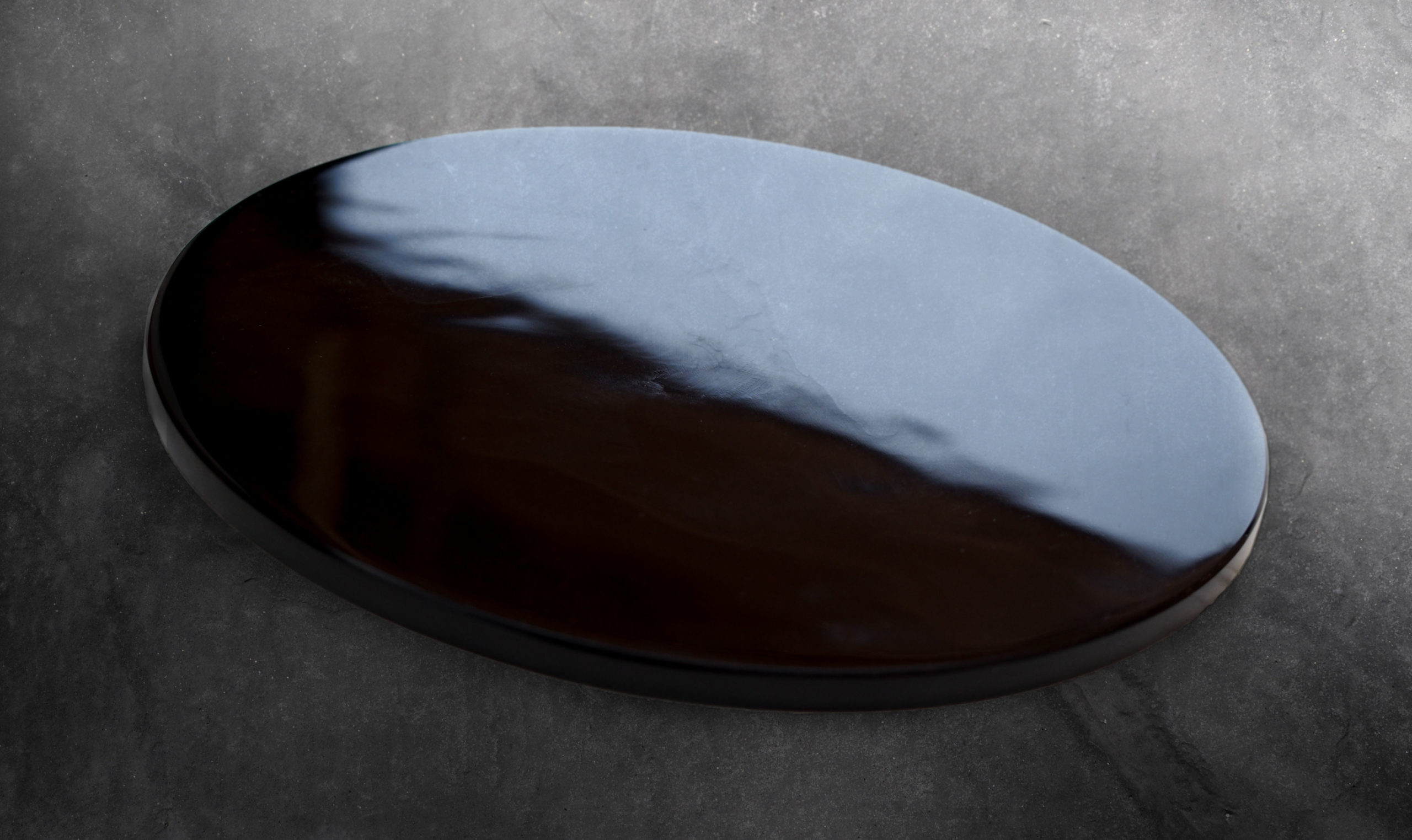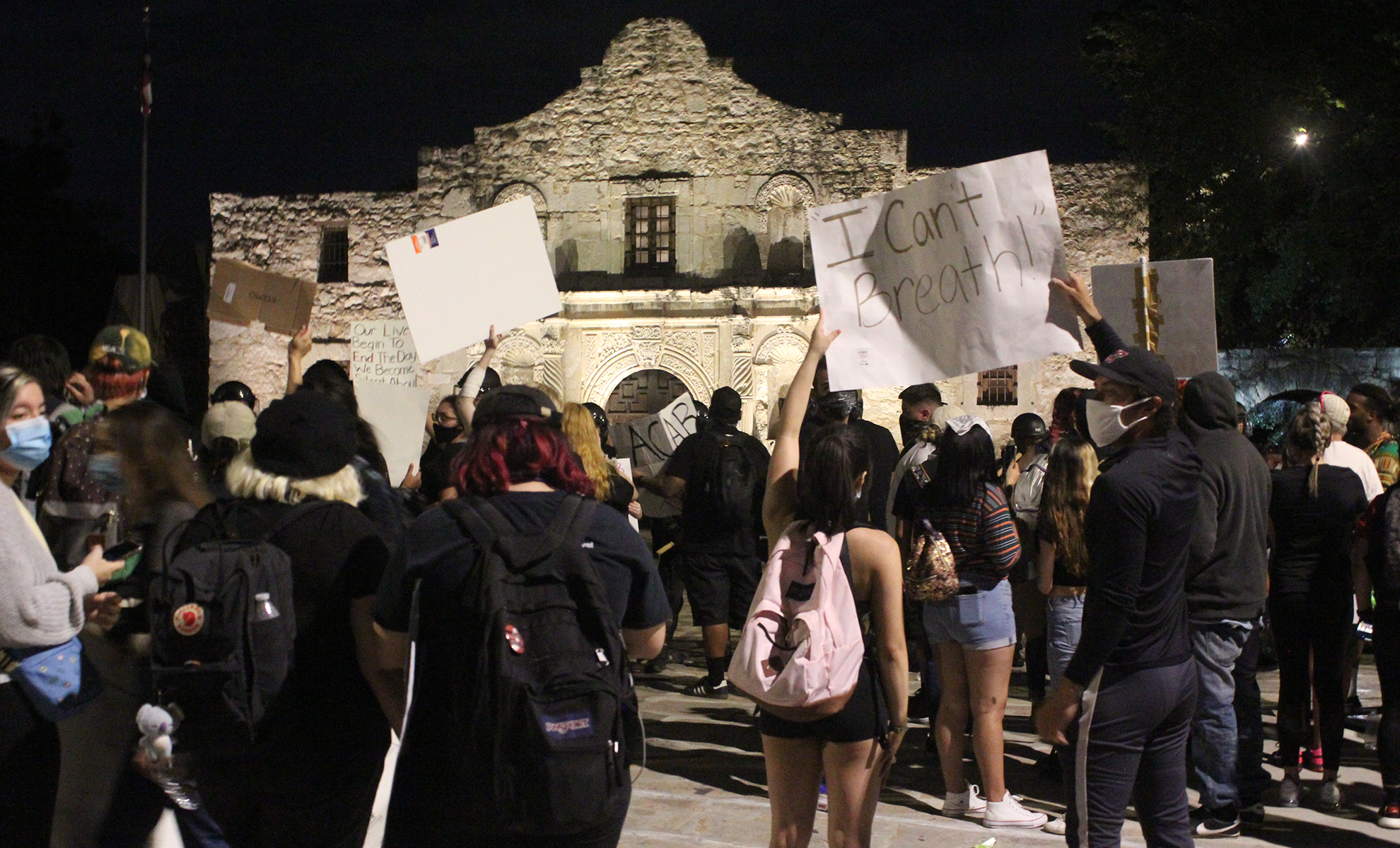Big Hand Fred and His Kodak Ektralite
Over the next few months we’ll be publishing the four finalists from our first annual short story competition (Read the winning entry here). First up is Landon Houle’s “Big Hand Fred and His Kodak Ektralite.”
Twice they’d listened to “Rainbow at Midnight” because the half-wit rocked somebody’s baby, and the Texas Troubadour was the closest any of them had to a lullaby. The jukebox glowed in that near darkness, for on a Wednesday night at the Whirl Pool and Bowl no one bothered to trip the last rows of lights. Chairs still set atop most of the round tables like the finialed crowns of fallen kings, and in the shadows an old man, cataract-blind, held a glass tumbler to his sunken chest and stared at nothing. The rest numbered less than a dozen, and they called themselves The Faithfuls, and when the slide quit the fingerboard a last time they must have been glad, or perhaps they figured not to wake the infant who slept against the half-wit’s thick arm, as none of them fumbled for more dimes.
It was this congregation that Big Hand Fred addressed when he hobbled through the back door saying he’d seen something in the sky.
Few heads turned his direction. A pair of illegals shot stick at a ripped felt table. The striking of pool balls played like an off-key piano.
Behind the bar, Scratch poured a couple of whiskeys and took one as his own. Bird or plane? he said.
Fred limped from the gloom, coming no closer than the bank of burning lights nearest the back door. The Whirl was once a warehouse, an immense quarters absent of interior wall, but these were a plains people, accustomed to vastness of space. They’d learned to imagine themselves bigger and louder until it was confines they feared. A farmhouse might have stood between Fred and the bar where Scratch sipped his whiskey and Wayne Self downed the other.
Too dark for birds, Fred said. And it weren’t no airplane.
Wayne grinned, showing a chipped front tooth. Had to be one of the two, he said. You too old to be seeing superheroes.
Maybe it was Superman, the yellow-haired woman said. She hung on Wayne’s arm like a voice thrower’s doll.
Scratch snorted, then belched.
Wayne put his hand over the woman’s. Like I say, darlin’, Freddy’s too old for Superman and too ugly besides.
The illegals stopped their game. They propped themselves on the bowed house cues and made a study of Fred’s coveralls with the sleeves cut for summer. They waited for a muscle to flinch in those bare arms, the hands to yield fists.
You’re sure right, Scratch said. He topped Wayne’s glass and filled his own to the lip. Clark Kent don’t take much to old men, but he loves some big beautiful titties.
Their laughing stirred the baby, a wail that rattled in the chest. The half-wit bounced the infant on his shoulder, and the yellow-haired woman lit a long cigarette.
Fred rocked on his heel; whether to lead or leave them was difficult to tell. Weren’t no cartoon character, he said.
A few of them followed but most did not. A scant procession it was, and those abiding found themselves wanting to blink as they crossed the threshold, despite the night without and the mammoth sky glinting with stars, some already dead.
Whereabouts, Scratch said. He’d traded the tumbler for the bottle, and this he aimed at the troposphere as if owning the Whirl made him sole proprietor of the ozone above it.
Big Hand Fred pointed. That’s where I seen the light, he said.
Beside Scratch, the yellow-haired woman looked askance.
Likely one of them satellites, the old veteran said. He pushed at his horn-rimmed glasses. They got outer space shot through with the damn things.
I can’t track what all they do up there or what they do it for, the woman said. She lost her balance and caught herself against Scratch.
They got cameras on them things. The veteran’s knobby head rolled loosely about the neck. Better believe they’re watching us right now, he said.
The woman lit another cigarette. She blew smoke out the side of her mouth. What they want to look down at us for? she said, but the veteran didn’t answer.
Scratch drank from the bottle, then pointed it skyward as though beading an invisible target.
Eventually, somebody inside called for a damn barkeep, and Scratch shouted, Get it your damn self, Wayne, and Scratch and the woman got tickled about this being her man’s name only backwards. Your damn self, Wayne, Scratch said again. Damn Wayne Self, said the woman.
A glass broke within the Whirl, and somebody fed the jukebox so Loretta could sing about not coming home a’drinking, and the baby screamed with colic, and, still laughing, Scratch and the yellow-haired woman stumbled inside.
The veteran shook a finger that seemed all knuckle. Believe you me, he said, and then he too was gone.
The next afternoon found Big Hand Fred a sentry in a purple plastic lawn chair with his back to the Whirl.
You know how to work that fancy thing? Scratch said. He’d come to offer Fred a beer, and once refused, Scratch pulled on both bottles so neither would get skunked.
I can hit a damn button if that’s what you’re getting at, Fred said. He held the camera up to his face. Boy at the counter told me that’s all there is, he said, but Scratch was already back inside, relating the merits of stop action as he’d managed to gather and otherwise invent.
Though it was still light out, they’d already levied their change, and a fiddle’s moan flooded the plain that iron turned crimson. The old warehouse building hung on the outskirts of Irene, and beyond stretched rows of furrowed earth like a great red sea, but it was the Whirl that expelled its wreckage by fitful moon tidepull-tabs and broken glass flotsam that Fred ground beneath his boot heel. He waited.
It was Scratch who said maybe Big Hand Fred saw a flying saucer. Of late, several of The Faithfuls spent their evenings behind the old warehouse venturing their conjectures until they could see what it was for themselves. Scratch stocked a wheelbarrow with ice and Lone Star and gave up on keeping tabs, the counting of things less important than what might be missed in the looking away.
Like a family of nocturnals at picnic, they bided their time mapping the constellations and naming a few of their own, and every so often Fred, spying something they couldn’t, lit their faces with the Kodak Ektralite’s built-in flash.
There, he’d say, and they’d stand and squint. Is that it? Is that it?
They weren’t little kids anymore, Wayne told them. They couldn’t go around believing everything people said. He’d bought a pair of binoculars at the army surplus, but even with such advances, as yet he could not count himself a witness. Like the others, he woke mornings sore-necked and bleary with no sign until Big Hand Fred offered the envelope of photographs from the selfsame coveralls that had, by this time, acquired a sediment of red dust at cuff and collar. Resembling some wayfarer returned home, Fred watched as each in turn received the prints, save for the half-wit in the corner who dangled his janitor’s keys over the infant like a thurible for censing.
Figured on taking those down to the Hesperian, he said.
Wayne held one of the photos close to his face. So accustomed had he become to the powers of magnification his very vision had changed. Without the binoculars, objects appeared smaller than they were, a world of things reduced that fostered conviction in Fata Morganadesert coastlines, phantom castles of gold refracted in the sky. You can’t take pictures like this to that rag, he said. Those Baptists ain’t gonna print it first off, and if they did, it’d be down at the corner under all them wedding announcements and crock-pot recipes.
They nodded, flat-lipped as a body of criminals at sentence except the old veteran, who’d been steadily sipping from a tumbler since studying the photographs himself. Got a grandson in Midland, he said. Works down at the news station.
The yellow-haired woman took her hand from her face. People used to say she was pretty enough to be in the movies, but they didn’t say it much anymore. You mean he’s on TV? she said.
Far as I know. The old veteran pushed at his glasses. Behind the heavy lenses, his eyes were round and wet. Don’t have one that works myself, he said.
They might have been surprised when the grandson agreed to make the trip had they allowed themselves to consider the possibility that he wouldn’t. The lot of them were second-hand witnesses of what they could not explain, and their pride wouldn’t account for contempt, the likelihood of logical explanation. In the weeks since they’d first seen the photographs, the grandson’s coming acquired an inevitability that precluded any doubt. They turned the Whirl inside out, dragging the bar chairs and the tables through the back door. That afternoon, they’d strung a length of fishing line from the roof to a nearby telephone pole from which the yellow-haired woman hung stars she’d cut from beer flats.
If the Whirl was changed so too were its people, clad in what they called church clothes, no matter that most hadn’t darkened such a door since their youth except for the occasional funeral. While the sun relented that afternoon, the heat did not, and those with sport coats risked stroke to cover sweat-darkened shirts. They gathered before the old warehouse, ambassadors-at-large hailing the grandson’s advent.
They waited long past the allotted time, watching the state road as they had the sky for many nights now as if the buckled asphalt might itself produce something of the miraculous.
He’s late, Wayne said when the old veteran finally clapped his hands once and pointed to a Buick drifting toward the ditch. The sedan, gold paint aflash, angled down the short unpaved road that led to the Whirl. That’s him, the veteran said, though by then they knew it could be no one else. He directed the grandson into the packed-dirt lot with a complicated series of hand gestures more suited to landing a plane than parking a Skylark. The car windows were down, and they heard his musica song they didn’t recognize.
You’ll bust your ears, the veteran said. The boy cut the engine and unfolded himself from the sunken seat. He was long-haired and narrow-chested in a Pink Floyd T-shirt.
Boy don’t look very professional, Scratch said through his teeth. Among their ranks, only Scratch could claim a television appearance. A few years back, a tornado chewed up his single-wide and spit it out three miles down the road. A reporter with a tie blown over his shoulder stuck a giant microphone in Scratch’s face and asked just how he felt about it.
They’re doing things different now, Fred said. He went to shake the grandson’s hand, the Kodak Ektralite swinging like a pendulous charm from the nylon band about his wrist.
Wayne opened another beer and took a long pull. He narrowed his eyes at the kid who was just then talking to the yellow-haired woman. She held the hem of her black dress, the beginning of a curtsy.
Hey, Wayne said as though he meant to be heard from a distance much greater than that which actually separated him from the grandson. Bet you could use some help with your equipment.
The veteran swatted the air. He was suddenly made even older by the appearance of this younger version of himself. Ain’t even all the way dark yet, he said. Let the boy get his wind. He took the crook of the kid’s elbow, and the others folded in like a flock of ruminants. They made a pageant around the warehouse building where the jukebox sat crookedly in the dirt, a netherworld beast with an extension cord tail. Wayne dropped some Hank Williams. He lit a cigarette, tapped ash on the dry ground.
Sit anywhere you like, Scratch said. He played the host, gesturing toward the tables and the blind man they’d towed from the Whirl like any other piece of furniture.
We didn’t figure it’d just be you, Fred said.
The yellow-haired woman had fixed the boy a plate, and the grandson worked a wedge of cornbread he couldn’t seem to swallow. He eyed each of them in turn as though he expected to find something he’d lost there in the hollows of their faces. I’d of brought me a crew, he said. But they all got sent up to the wildfire.
Scratch grunted. Rain, he said, there’s you a story. A fire ain’t no news. Happens ever summer.
Sons of bitches, the old veteran said.
Guess fire’s more exciting, the grandson said.
The rest dished their food, and while they could have taken their pick of empty chairs, they assumed those nearest the grandson. They ate huddled around the one table, and when they finished, the yellow-haired woman took up their plates. Big Hand Fred waited for everyone to get more drinks, and then from a pocket inside the burrowed jacket he pulled an envelope worn soft. These my pictures, he said.
It was the time of day measured in advancing shadow, and someone called for the flood lamps they’d C-clamped to the roof so the boy could see the photographs, but the bulbs only popped. The jukebox whirred and then died, and the grandson watched several of the men hoist themselves, groaning as they shuffled to check the fuse box in their funeral fineries. He drummed his fingers along the envelope’s edge. If there was anything in those photos, he’d claim them as his own. Go to Dallas, make a name for himself there. He’d be the one on TV then. Maybe even an anchor.
By the time they flipped the breaker, the grandson had pocketed a couple of beers and excused himselfto take a leak, the old veteran said. To get his equipment, said the yellow-haired woman. When they first heard the engine, they couldn’t understand why it was starting.
So much for the video camera, Wayne said. Could have gone to the Hesperian if we wanted our pictures stolen. He went to stop the boy, but it was too late. The music faded as the Skylark turned onto the state road.
The old veteran looked befuddled, the heavy glasses sitting crookedly on his nose.
Seemed like a good kid, Fred said. He’ll be back.
The bright bulbs burned, casting the fields beyond into uncertain darkness. They lingered there at the edge of the Whirl while the half-wit paid the jukebox for that song about the rainbow. He danced with the infant in his arms, shielding her from those winged creatures drawn to the light and flinging themselves earnestly against the paper stars.
Landon Houle is a doctoral student studying creative writing at Texas Tech. Her work has appeared in Confrontation and Natural Bridge among other journals.


